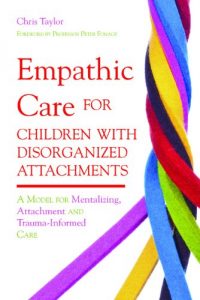Disorganized attachment is the most extreme form of insecure attachment. This book is a practical guide to caring for children and young people with disorganized attachment and related emotional and psychological difficulties.
Synthesising attachment, trauma and mentalization theory into a useful practice model, Empathic Care for Children with Disorganized Attachments proposes ways of meeting the needs arising in children and young people with disorganized attachments. Focusing on the importance of interpersonal bonds to facilitate the child's capacity to mentalize, it aims to equip the reader with the appropriate skills to provide effective, sustained and, most importantly, empathic care to the most vulnerable and troubled children. This structured psychotherapeutic approach to caregiving will enable the development of child–carer relationships and can be used to create informed, safe environments that support both the young person and the caregiver.
This useful guide will be invaluable to health and social care professionals including residential carers, therapists, counsellors, and those working with vulnerable and troubled children and young people including those supporting foster and adoptive families.
Synthesising attachment, trauma and mentalization theory into a useful practice model, Empathic Care for Children with Disorganized Attachments proposes ways of meeting the needs arising in children and young people with disorganized attachments. Focusing on the importance of interpersonal bonds to facilitate the child's capacity to mentalize, it aims to equip the reader with the appropriate skills to provide effective, sustained and, most importantly, empathic care to the most vulnerable and troubled children. This structured psychotherapeutic approach to caregiving will enable the development of child–carer relationships and can be used to create informed, safe environments that support both the young person and the caregiver.
This useful guide will be invaluable to health and social care professionals including residential carers, therapists, counsellors, and those working with vulnerable and troubled children and young people including those supporting foster and adoptive families.






